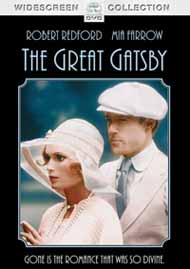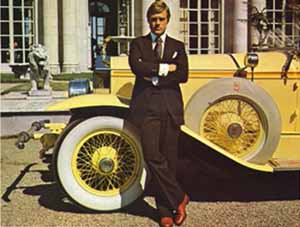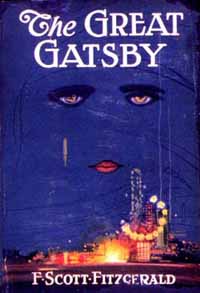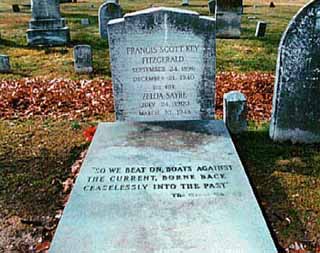رمان "گتسبی بزرگ"، شاهکار فیتز جرالد، اولین بار در سال 1925 چاپ شد؛ اما در آن زمان محبوبیتی را که در خورش بود به دست نیاورد.
بعضیها از اینکه این کتاب یک رمان عاشقانه با داستانی معمولی است یا در نهایت –مثل خیلی از رمانها- رمانی دربارهٔ جنگ بین فقیر و غنی است و در عین حال جزء بهترین رمانهای قرن بیستم قرار گرفته است، متعجب بودند. چیزی که گتسبی بزرگ را متفاوت میکند، داستان رمانتیکش نیست؛ بلکه تِم اصلی آن است که به زوال «رؤیای آمریکایی» میپردازد و از این حیث، جزء معدود کتابهایی است که به این موضوع پرداخته است.
رؤیای آمریکایی، در بین ملت آمریکا اصطلاحی شناخته شده است که اولین بار، نویسنده و مورخ آمریکایی «جیمز تراسلو آدامز» در سال ۱۹۳۱ آن را مطرح کرد: «رؤیای آمریکایی رؤیای سرزمینیست که تک تک مردمامنش باید زندگی بهتر٬ مرفهتر و کاملتری را در آن تجربه کنند و بنا بر توانایی و دستاوردهایشان فرصت رسیدن به آن را نیز داشته باشند. تفسیر چنین رؤیایی برای طبقات بالای جامعهٔ اروپایی کمی سخت است٬ همچنانکه اکثر ما نیز نسبت به تحقق این شعارها (عدالت و مساوات برای همهٔ طبقات جامعه) خسته و دلسرد شدهایم. اما این رؤیا تنها رؤیای داشتن ماشین و حقوق بالا نیست٬ بلکه رؤیای داشتن جامعهای بدون فاصلهٔ طبقاتی است. جامعهای که در آن هر مرد و زنی بتواند به بالاترین مقام و منصبی که شایستهٔ او است برسد و این مقام و مرتبه، بدون توجه به اینکه در کجا و در چه شرایطی متولد شده است، از سوی دیگران نیز به رسمیت شناخته شود.»
از زمان استقلال آمریکا و با انتشار اعلانیهای که در آن از «مساوات میان همهٔ انسانها و حقوق مسلمشان مثل حق زندگی و آزادی و حق به دست آوردن خوشبختی» سخن گفته شده بود٬ توهم دموکراسی و یافتن زندگی بهتر در سرزمینی که هنوز ناشناخته و سرشار از نعمتهای طبیعی بود٬ میان مردم امریکا و دنیا شکل گرفت. کشوری که در آن همه میتوانند بدون توجه به قومیت و نژاد و طبقهٔ اجتماعی و مذهب خویش، به آنچه که میخواهند دست یابند و این موضوع به موج عظیم مهاجرت به ینگه دنیا منجر شد. میگویم توهم چون حتا خودشان هم معتقدند که رؤیای آمریکایی امروز یک رؤیای از دست رفته است و اصولاً ساختار ثروت در آمریکا به گونهای است که منجر به فاصلهٔ طبقاتی میشود.
گتسبی بزرگ و «از موشها و آدمها» از جمله رمانهای مهمی هستند که به زوال و نابودی این رؤیا پرداختهاند و بر این موضوع نورافشانی کردهاند که بعد از جنگ جهانی اول اقتصاد آمریکا شکوفا شد و وضع اقتصادی زندگی مردم بهتر شد، اما این شکوفایی با از بین رفتن اخلاقیات و ارزشهای جامعه همراه شد. در این دوره حرص و طمع و رفاهزدگی و مصرفگرایی بین مردم زیاد شد و هرکس به دنبال خوشبختی دست به هرکاری میزد. هر فردی از هر طبقهٔ اجتماعی که بود، میتوانست به راحتی ثروتی به هم بزند (مخصوصا اینکه ممنوعیت فروش الکل زمینهای را برای قاچاق آن فراهم کرد و خیلیها توانستند از راههای نامشروع پولدار شوند) با این وجود این گروههای تازه به دوران رسیده هیچگاه نتوانستند در میان طبقهٔ اشراف و پولدارهای قدیمی مشروعیتی کسب کنند. اسکات فیتز جرالد ( او را با مترجم رباعیات خیام اشتباه نگیرید) در پس داستان رمانتیک خود از این رؤیا (رؤیای داشتن زندگی بهتر مرفهتر و کاملتر) سخن میگوید از رؤیایی که تحقق بخشیدن به آن (رفاهطلبی و لذتجویی) به قیمت قربانی شدن تکامل انسانی و اخلاقیات جامعه تمام شد.
داستان از زبان نیک کراوی روایت میشود که در تابستان سال ۱۹۲۲ برای کار به نیویورک میآید و در منطقهٔ وست اِگ در لانگ آیلند خانهای اجاره میکند. طبق توصیفات نیک٬ وست اِگ محلهٔ پولدارهای تازه به دوران رسیده است. آدمهایی که چندی نیست که صاحب مال و منال شدهاند و هنوز نتوانستهاند خود را میان طبقات مرفه جامعه جا بیندازند و با آنها ارتباط برقرار کنند و سعی دارند با ولخرجیهای بسیار، ثروت خود را به رخ دیگران بکشند. همسایهٔ نیک در وست اِگ فرد ناشناسی است به نام جی گتسبی که هر یکشنبه شب در امارت بزرگ خود مهمانیهای شبانهٔ مفصلی برگزار میکند.

اما نیک مانند بقیهٔ ساکنان این محله نیست. او فارغالتحصیل دانشگاه ییل است و در محلهٔ ایست اِگ که متعلق به طبقهٔ اشراف و قدیمی نیویورک است٬ آشنایانی دارد. دیزی دختر عموی نیک و همسرش تام بوکانن از همکلاسیهای قدیمی نیک در دانشگاه ییل هستند که در این محله زندگی میکنند و دختر بچهٔ کوچکی دارند که چندان محبوب پدر و مادر نیست. در رفت و آمد به خانهٔ بوکاننها نیک با دختر جوان و زیبا! و ورزشکاری به نام جردن بیکر آشنا میشود.
رابطهٔ بین نیک و جردن صمیمیتر میشود و او از زندگی و ازدواج دیزی و تام برای نیک میگوید. از اینکه تام معشوقهای دارد به نام میرتل که در محلهای صنعتی و پایین شهر زندگی میکند و زن ویلسون کارگر پمپ بنزین است. تام اما ابایی از آشکار کردن این رابطه برای نیک ندارد چنانکه روزی او را همراه میرتل به آپارتمان مخفیاش در نیویورک میبرد. میرتل برای شب مهمانیای تدارک میبیند و آدمهایی از طبقهٔ خودش را به خانه دعوت میکند. مهمانی شلوغ میشود و مستی زیاد، دردسر آفرین میشود. چنانکه میرتل زندگی زناشویی تام و دیزی را مسخره میکند و تام ِ عصبانی پاسخ او را با مشت میدهد و دماغ میرتل را میشکند!
روزهای تابستانی یکی پس از دیگری سپری میشوند و بعد از آن همهٔ مهمانیهای مرموز و رؤیایی یکشنبه شبها. بالأخره روزی گتسبی دعوتنامهای را هم برای نیک میفرستد. نیک به مهمانی میرود و در آنجا جردن را میبیند. هیچکس گتسبی را درست نمیشناسد و از گذشتهاش دقیق با خبر نیست. به همین دلیل هم شایعات زیادی دربارهٔ او میشوند تا اینکه سرصحبت را با یک نفر باز میکند و متوجه میشود او گتسبی بزرگ است. گتسبی جوان عجیبی است با ظاهری عجیب که خندهای منحصر به فرد بر لبش دارد و سعی میکند به لهجهٔ انگلیسی (بریتانیش) صحبت کند.
گتسبی از جردن میخواهد که چند کلمهای خصوصی با او صحبت کند. و بعد جردن ماجرای دیدار خود و گتسبی را برای نیک تعریف میکند. گتسبی به جردن میگوید که دیزی را اولینبار در سال ۱۹۱۷ ملاقات کرده و از همان موقع عاشقش شده است. به او میگوید که شبهای بسیاری را به شوق دیدن او پشت سر گذاشته و تمام این مهمانیها و ولخرجیها برای این است که شاید نظر دیزی را به خود جلب کند. وقتی گتسبی از رابطهٔ خانوادگی نیک و دیزی با خبر میشود با او نزدیکتر شده و رفاقتی بین این دو شکل میگیرد. حال گتسبی از نیک میخواهد تا زمینهای را فراهم کند که او و دیزی همدیگر را ببینند اما از سویی نگران است که اگر دیزی باخبر شود که او هنوز دلبسته اش است او را نپذیرد. نیک بدون آنکه دیزی را از حضور گتسبی باخبر کند او را به خانهاش دعوت میکند. دیزی و گتسبی همدیگر را در ملاقات میکنند و هرچند در ابتدا سرد و از روی خجالت اما اندکی نمیگذرد که با هم نزدیک میشوند و آتش عشق قدیمیشان دوباره شعلهور میشود!
رفت و آمد میان این دو آغاز میشود و گتسبی به عنوان دوست خانوادگی به منزل بوکاننها رفت و آمد میکند و گاه آنها را به مهمانیهایش دعوت میکند. دیزی مجذوب زندگی شاهانه و رمانتیک گتسبی میشود و بیشتر به او سر میزند. تا اینکه روزی تام که از قبل به رابطهٔ همسرش و گتسبی مشکوک شده از نگاههای عاشقانهٔ او به دیزی به ماجرا پی میبرد. دیزی از روزهای تابستانی ابراز کسالت میکند و تام هم از فرصت استفاده کرده و همه را مجبور میکند که برای تنوع به نیویورکسیتی بروند.
دیزی و گتسبی در یک ماشین و نیک و جردن و تام با ماشین دیگری عازم میشوند. وقتی که برای بنزین زدن توقف میکنند متوجه میشوند که ویلسون به خیانت همسر خود پی برده و میخواهد از آن منطقه برود. در نیویورکسیتی تام که به پیشینهٔ گتسبی پی برده (اینکه او حتا به کالج هم نرفته و از طریق قاچاق مشروب پولدار شده) او را به مسخره میگیرد و گتسبی هم که از عشق دیزی نسبت به خود مطمئن است با او بحث میکند. اما دیزی که تا آن روز عاشق گتسبی بوده با شنیدن این صحبتها و پی بردن به حقیقت دوباره خود را به تام نزدیک میکند. تام که دیزی را خوب میشناسد آنها را مجبور میکند که با ماشین گتسبی به خانه باز گردند تا ثابت کند که او درحد و اندازهای نیست که رابطهاش با دیزی او را ناراحت کند.
بعد از رفتن آن دو٬ نیک و جردن و تام هم رهسپار خانه میشوند اما در مسیر روبروی پمپ بنزین با جمعیتی روبرو میشوند و میفهمند که تصادفی اتفاق افتاده و میرتل کشته شده است. مغازه داری که شاهد ماجرا بوده به آنها میگوید که یک ماشین زرد بزرگ به میرتل زده و فرار کرده است. آنها میدانند که این ماشین متعلق به گتسبی است. وقتی به خانه میرسند، نیک٬ گتسبی را میبیند که پشت بوتهها مخفی شده و نگران است که تام بلایی سر دیزی بیاورد و به او میگوید که دیزی در هنگام تصادف پشت فرمان بوده اما او حاضر است مسؤولیت آن را بپذیرد.
نیک به خانه میرود اما شب را نمیتواند بخوابد و صبح دوباره به دیدن گتسبی میرود. او به نیک میگوید که شب تا سحر را در خانهٔ دیزی مخفی شده بوده تا اگر تام با او دعوا کرد و دیزی بیرون آمد او را ببیند اما هیچ اتفاقی نیافتاده بوده و بعد حقیقت را برای نیک باز میگوید. اینکه او با دیزی نامزد بودند اما از آن جایی که خانوادهٔ دیزی از طبقات بالای جامعه بودند او دربارهٔ گذشتهٔ خود به دیزی دروغ گفته تا دیزی عشقش را بپذیرد. دیزی به او قول میدهد تا بعد از بازگشت او از جنگ منتظرش بماند اما وقتی برمیگردد متوجه میشود که او با تام ازدواج کرده است. اینکه نام واقعی او جی گتز است و گتسبی بزرگ لقبی است که مردی که برای او کار میکرده به او داده بود. او تصمیم گرفته بوده به هرنحو ممکن برای رسیدن به دیزی پولدار شود و از همین رو وارد کار قاچاق مشروب شده است. نیک به او میگوید که دیزی لیاقت این عشق او را ندارد اما گتسبی که در ذهنش معشوق ایدهآلی از دیزی ساخته و سالها برای زسیدن به او تلاش کرده حرف او را نادیده میگیرد و میگوید که زندگی بدون دیزی برایش معنایی ندارد.
از سوی دیگر ویلسون که میخواهد انتقام قتل همسر خود را بگیرد پیش خود مطمئن میشود که قاتل او همان کسی است که با او رابطه داشته پس پیش تام میرود چون میداند که او صاحب ماشین زرد رنگ را میشناسد و از سویی او بعد از کشته شدن میرتل به صحنه رسیده بوده و خود نمیتواند آن مرد ناشناس باشد. تام صاحب ماشین را به ویلسون معرفی میکند و او به سراغ گتسبی میرود و پیش از آنکه گتسبی خود را در استخر خانه غرق کند با شلیک گلوله میکشد و بعد هم خودکشی میکند. پس از مرگ گتسبی نیک مراسم ختمی برای او میگیرد اما هیچکس از جمله جردن و تام و دیزی (که به بهانهای از آن محل رفتهاند) و تمامی کسانی که به مهمانیهای او میآمدند در آن شرکت نمیکنند. جردن به نیک میگوید که با فرد دیگری آشنا شده و او را رها میکند و نیک، متنفر از مردمان آن منطقه به شهر خود باز میگردد. بعد از مدتی تام را میبیند و تام به او میگوید که او بوده که ویلسون را به سراغ گتسبی فرستاده و چقدر ناراحت است که مجبور شد آن آپارتمان مخفیاش را بفروشد.

نیک با خود میاندیشد که همانطور که عشق گتسبی به دیزی به خاطر بیصداقتی و تلاش او برای پولدار شدن بیارزش شد، رویای آمریکایی ِ به کمال رسیدن و خوشبخت شدن نیز تبدیل به حرص و طمع برای پول شد و به زوال رفت. هرچند آن چه گتسبی را «بزرگ» کرد تلاشهایش برای تحقق بخشیدن رویایش بود اما عصر رویاها و آرزومندی-چه رویای رسیدن به عشق و چه رویای آمریکایی- دیگر به پایان رسیده است.
زهرا نیرومند
برگرفته از:asha.ir



نظر